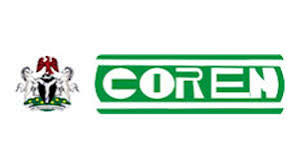
Regulating Engineering, Profession For Shared
Prosperity In Nig
The Council for the Regulation of Engineering in Nigeria, COREN is a statutory body set up by the Federal Government of Nigeria, with the mandate to regulate and control the education, training and practice of Engineering in all aspects and ramifications.
COREN carries out this mandate through Accreditation of Engineering Programmes in Universities, Polytechnics and Technical Colleges, Training and Certification of Engineering Practitioners, Registration of Engineering Personnel & Firms and their annual Licensing, Engineering Regulation Monitoring & Enforcement and Issuance of Engineering Regulations.
Currently, COREN has on its register about Eighty Thousand Registered Engineers. At the 31st Engineering Assembly which was held on 7th – 9th August, 2023, a draft Road Map for COREN was considered by the Engineering family with over eight thousand participants buying into the concept.
Shortly after, the Council approved the structure and the implementation had since kicked off.
A retreat was planned and successfully held from 8th – 9th March, 2024.
The outcome of this exercise was a clear strategic plan for 2024 – 2030 that drew new directions, policies, strategies, programmes, activities, amongst others, for effective and efficient operations and quality service delivery; an established mechanism for the generation of higher IGR on a sustainable basis reflecting the current realities, challenges, and opportunities.
Work and efforts towards the realization of the Full Signatory Status of the Washington Accord and becoming Provisional Signatories of the Dublin & Sydney Accords, to accommodate the Engineering Technologists and Technicians in this journey, are in top gear. September 2-4, 2024 will feature the 32nd annual Engineering Assembly with the theme: “Regulating Engineering Profession for Shared Prosperity in Nigeria”.
This year’s Engineering Assembly’s theme has been carefully selected with four other related sub-themes for it is our conviction that a robust Engineering profession will be a strong catalyst for the success of industrial development of Nigeria and indeed the Africa we want.
This year’s Assembly is special as the Chair of the Dublin Accord and President, Malaysian Society of Engineering and Technology, Prof. Ir. Megat Johari bin Megat Mohd Noor will educate and have in-depth discussions with participants on COREN’s present status and pathway to achieving the aforementioned memberships.
It commenced yesterday with the arrival and registration of participants as well as Conference materials collection by online registrants.
Technical sessions centered on this year’s theme will follow up after the Opening Ceremony today.
The plenary sessions would create opportunities for interaction of practitioners in government, private sector, industry and the academia.
The Sector Skill Council for Engineering will also be inaugurated.
The three-day event will include the “Engineering Family Forum” which is a platform for the interaction between members of the Engineering family, and in this year’s case, there will be a workshop centred on COREN’s admittance into Sydney and Dublin Accords.
This Assembly will have President Bola Ahmed Tinubu as the Special Guest of Honour; the Managing Director/CEO Dover Engineering Limited, Engr.
Eloka Ejeh, FNSE as the Chairman of the occasion; the Honourable Minister of Works, Senator David Umahi as the Chief Host; the Honourable Minister of Housing and Urban Development, Architect Ahmed Musa Dangiwa; the Honourable Minister of FCT, Nyesom Wike, CON as the Host and the President of COREN, Prof. Sadiq Zubair Abubakar, as the Co-host, amongst other dignitaries.
The path to effective regulation is not without challenges.
By investing in a strong regulatory framework and embracing a culture of continuous improvement and ethical conduct, Nigeria can unlock the full potential of its engineering sector, paving the way for a prosperous and sustainable future.
By Prof. Adisa Bello, Edited By Grace Namiji



Commentary
Regulating Engineering, Profession For Shared Prosperity In Nig
todaySeptember 12, 2024 5
Regulating Engineering, Profession For Shared
Prosperity In Nig
The Council for the Regulation of Engineering in Nigeria, COREN is a statutory body set up by the Federal Government of Nigeria, with the mandate to regulate and control the education, training and practice of Engineering in all aspects and ramifications.
COREN carries out this mandate through Accreditation of Engineering Programmes in Universities, Polytechnics and Technical Colleges, Training and Certification of Engineering Practitioners, Registration of Engineering Personnel & Firms and their annual Licensing, Engineering Regulation Monitoring & Enforcement and Issuance of Engineering Regulations.
Currently, COREN has on its register about Eighty Thousand Registered Engineers. At the 31st Engineering Assembly which was held on 7th – 9th August, 2023, a draft Road Map for COREN was considered by the Engineering family with over eight thousand participants buying into the concept.
Shortly after, the Council approved the structure and the implementation had since kicked off.
A retreat was planned and successfully held from 8th – 9th March, 2024.
The outcome of this exercise was a clear strategic plan for 2024 – 2030 that drew new directions, policies, strategies, programmes, activities, amongst others, for effective and efficient operations and quality service delivery; an established mechanism for the generation of higher IGR on a sustainable basis reflecting the current realities, challenges, and opportunities.
Work and efforts towards the realization of the Full Signatory Status of the Washington Accord and becoming Provisional Signatories of the Dublin & Sydney Accords, to accommodate the Engineering Technologists and Technicians in this journey, are in top gear. September 2-4, 2024 will feature the 32nd annual Engineering Assembly with the theme: “Regulating Engineering Profession for Shared Prosperity in Nigeria”.
This year’s Engineering Assembly’s theme has been carefully selected with four other related sub-themes for it is our conviction that a robust Engineering profession will be a strong catalyst for the success of industrial development of Nigeria and indeed the Africa we want.
This year’s Assembly is special as the Chair of the Dublin Accord and President, Malaysian Society of Engineering and Technology, Prof. Ir. Megat Johari bin Megat Mohd Noor will educate and have in-depth discussions with participants on COREN’s present status and pathway to achieving the aforementioned memberships.
It commenced yesterday with the arrival and registration of participants as well as Conference materials collection by online registrants.
Technical sessions centered on this year’s theme will follow up after the Opening Ceremony today.
The plenary sessions would create opportunities for interaction of practitioners in government, private sector, industry and the academia.
The Sector Skill Council for Engineering will also be inaugurated.
The three-day event will include the “Engineering Family Forum” which is a platform for the interaction between members of the Engineering family, and in this year’s case, there will be a workshop centred on COREN’s admittance into Sydney and Dublin Accords.
This Assembly will have President Bola Ahmed Tinubu as the Special Guest of Honour; the Managing Director/CEO Dover Engineering Limited, Engr.
Eloka Ejeh, FNSE as the Chairman of the occasion; the Honourable Minister of Works, Senator David Umahi as the Chief Host; the Honourable Minister of Housing and Urban Development, Architect Ahmed Musa Dangiwa; the Honourable Minister of FCT, Nyesom Wike, CON as the Host and the President of COREN, Prof. Sadiq Zubair Abubakar, as the Co-host, amongst other dignitaries.
The path to effective regulation is not without challenges.
By investing in a strong regulatory framework and embracing a culture of continuous improvement and ethical conduct, Nigeria can unlock the full potential of its engineering sector, paving the way for a prosperous and sustainable future.
By Prof. Adisa Bello, Edited By Grace Namiji
Written by: Salihu Tejumola
Profession For Shared Prosperity In Nig Regulating Engineering
Similar posts
Commentary
Need To Intensify Vector Control Services In Nig
todayOctober 11, 2024 16
Commentary
Safeguarding Critical National Assets For Sustainable Devt
todayOctober 10, 2024 17
Post comments (0)
Recent Posts
Recent Comments
After Hours
8:00 pm - 12:00 am
After Hours
With Mayowa Soname
Mayowa Soname takes the reins and invites you into a world of thought-provoking conversations, sultry tunes, and a dash of nocturnal magic. This show is designed to cater to the discerning tastes of adults, offering a curated blend of content that sparks intellect, stirs emotions, and celebrates life's rich complexities.
closeTop popular
How Wike Transformed Abuja In 1year
CG VGN Congratulates New Service Chiefs, IG, NSA
Stainless Steel Juicer – Making Juicing Fun And Easy
Uzoka-Anite Assumes Duty As Minister Of Industry, Trade and Investment
Stainless Steel Juicer – Making Juicing Fun And Easy
Chart
1
Sunshine
Tommy Blues
Sunshine Tommy Blues
2
Red
Frank Lee
Red Frank Lee
3
Eclipse
Donna May
Eclipse Donna May
Full tracklist